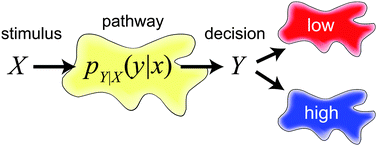A framework for designing and analyzing binary decision-making strategies in cellular systems†
Abstract
Cells make many binary (all-or-nothing) decisions based on noisy signals gathered from their environment and processed through noisy decision-making pathways. Reducing the effect of noise to improve the fidelity of decision-making comes at the expense of increased complexity, creating a tradeoff between performance and metabolic cost. We present a framework based on rate distortion theory, a branch of information theory, to quantify this tradeoff and design binary decision-making strategies that balance low cost and accuracy in optimal ways. With this framework, we show that several observed behaviors of binary decision-making systems, including random strategies, hysteresis, and irreversibility, are optimal in an information-theoretic sense for various situations. This framework can also be used to quantify the goals around which a decision-making system is optimized and to evaluate the optimality of cellular decision-making systems by a fundamental information-theoretic criterion. As proof of concept, we use the framework to quantify the goals of the externally triggered apoptosis pathway.


 Please wait while we load your content...
Please wait while we load your content...